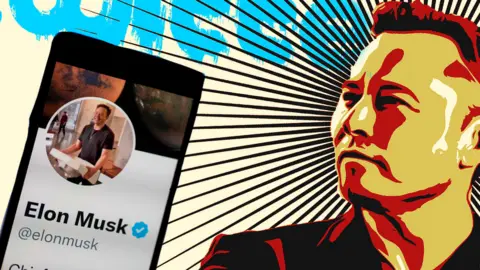Twitter condemned by UN and EU over reporters’ ban
 Getty Images
Getty ImagesThe United Nations has joined the European Union in condemning Twitter's decision to suspend some journalists who cover the social media firm.
Reporters for the New York Times, CNN and the Washington Post were among those locked out of their accounts.
The UN tweeted that media freedom is "not a toy" while the EU has threatened Twitter with sanctions.
A Twitter spokesman told a US tech news website the bans were related to the live sharing of location data.
Melissa Fleming, the UN's under secretary general for global communications, said she was "deeply disturbed" by reports that journalists were being "arbitrarily" suspended from Twitter.
"Media freedom is not a toy," she said. "A free press is the cornerstone of democratic societies and a key tool in the fight against harmful disinformation."
Earlier on Friday, EU commissioner Vera Jourova threatened Twitter with sanctions under Europe's new Digital Services Act which she said requires "the respect of media freedom and fundament rights".
"Elon Musk should be aware of that. There are red lines. And sanctions, soon," she added.
Mr Musk has not commented directly on the suspensions, but said in a tweet that "criticising me all day long is totally fine, but doxxing my real-time location and endangering my family is not".
The technology tycoon later set up a poll asking whether he should unsuspend the accounts "now" or "in seven days", suggesting the decision could be reversed sooner rather than later.
"Same doxxing rules apply to 'journalists' as to everyone else," he added, using a term to describe the release of private information online about individuals.
A spokesman for the New York Times called the suspensions "questionable and unfortunate".
The suspensions come after Mr Musk vowed to sue the owner of a profile that tracks his private jet.
He said a "crazy stalker" had used live location sharing to find and accost a vehicle carrying his children in Los Angeles.
But following the suspensions, the German Foreign Office warned Twitter that "press freedom cannot be switched on and off on a whim".
'A town square'
Mr Musk took control of Twitter in October in a $44bn ($36bn) deal.
When he completed his takeover, the billionaire told advertisers he bought the site because he wanted to "try to help humanity", and for "civilisation to have a digital town square".
He has made a host of changes to its moderation practices. The moves have alarmed some civil rights groups, who have accused the billionaire of taking steps that will increase hate speech, misinformation and abuse.
Any sanctions placed on Mr Musk's business over the account suspensions could be applied under the bloc's new Digital Services Act, which was approved by the EU earlier this year.
Under the terms of the proposed new law, the EU Commission will be allowed to impose fines of up to 6% of the global turnover of a firm that it finds breaks its rules.
In extreme cases, the EU could ask a court to suspend a rogue service, but only if it is "refusing to comply with important obligations and thereby endangering people's life and safety".
Matt Binder, a journalist for Mashable and one of those suspended, said he didn't know why he had been banned.
"I've been very critical of Musk in my reporting," he told the BBC. But he said that Mr Musk's claim "that everyone that got suspended was doxxing him - due to the jet tracker" was not true.
He said he had never tweeted a hyperlink to the tracker, but had mentioned the account after it had been suspended.
"Clearly the people who were suspended were handpicked, because there are literally hundreds of accounts per minute who tweeted the link."
Mr Binder, who has been on Twitter since 2008 and has been reporting on the developments at the social media site, said he was surprised at the ban on journalists.
"I knew it was a possibility but really thought he wouldn't because it would entirely wreck the facade of being a free speech platform."
On Friday, it emerged that NBC News executives had made the decision to pull their disinformation reporter, Ben Collins, from broadcasts due to his tweets earlier this month that were critical of Mr Musk.
Mr Musk later spoke to journalists on Twitter Spaces, part of the social media app that allows live audio conversations, but after answering a few questions about the ban he left and Twitter Spaces itself has since appeared to be suspended.
Twitter also suspended the official account of Mastodon, which has emerged as an alternative to Twitter since Mr Musk's takeover.
Links to individual Mastodon accounts also appeared to be banned. An error message notified users that links to Mastodon had been "identified" as "potentially harmful" by Twitter or its partners.


At the heart of all this is a father raging about the sharing of location data of his private jet, which he claims led to a security incident involving his young son X. The Twitter feed that started it all was scraping publicly available flight data. Not very decent, perhaps, but not illegal.
His fury has now extended to journalists who he claims also shared his location.
But this is a fundamentally flawed approach to moderation. I bet many of us wish we could suspend or ban social media accounts that post content we dislike.
It's not the first time Elon Musk has taken a very personal approach to content moderation. He refused to allow Infowars conspiracy theorist Alex Jones back on Twitter because he had used the death of children to further his career - and mentioned the loss of his own child, 10-week-old Alexander.
He has also suspended accounts which impersonated him.
Fundamentally, Elon Musk has shot down in flames his much-trumpeted commitment to "free speech". Free speech as long as it doesn't upset him personally, appears to be the message.

